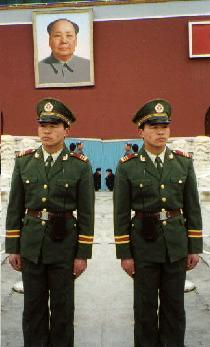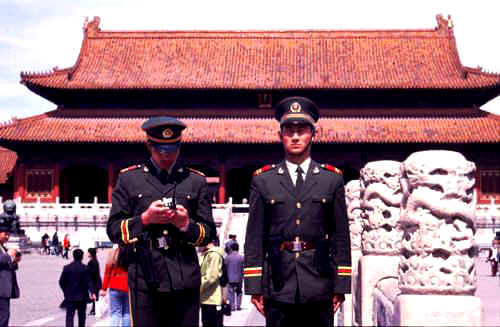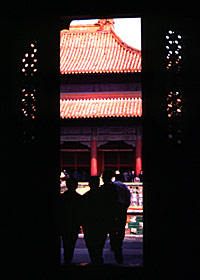Why is Beijing so Afraid???
A year after mounting the biggest protests in Beijing since Tiananmen Square in 1989, the Falun Gong refuses to fold. More protests filled the square on April 25, 2000. Why Beijing worries that a bunch of elderly people, waving their arms and doing breathing exercises in the park, might really bring down the world's biggest country
By Ron Gluckman/Beijing
E
LDERLY MEN WERE PUNCHED. Women with children were fiercely knocked to the ground, and more than a dozen people were arrested after attempting to sit in a circle and meditate under the watchful gaze of a huge portrait of Chairman Mao. An all-day series of cat-and-mouse skirmishes spilled across Tiananmen Square in Beijing on April 25, 2000 - the one-year anniversary of huge protests by the since-outlawed group Falun Gong.Despite ominous allusions in the press to an ultimate showdown with "a doomsday cult" that "is still capable of raising the devil in China," the day ended with scores in custody, many of them injured, but no resolution to the government's struggle with the group.
 If anything, the lack of
a conclusive showdown will be seen as a bitter blow to Beijing's ruling
Communist Party, which is intent on demonstrating its ability to crush a group
that claims millions of adherents across China.
If anything, the lack of
a conclusive showdown will be seen as a bitter blow to Beijing's ruling
Communist Party, which is intent on demonstrating its ability to crush a group
that claims millions of adherents across China.
While the battalions of police did manage to keep unrest from sweeping across the square, the heavy-handed tactics only exposed a weakness in the world's most populous nation.
Once again, China was unable to quiet the voice of Falun Gong followers. They shouted from vans as they were being taken away. They screamed to onlookers as the police knocked them to the ground.
Well organized underground
Tiananmen Square was the scene of nearly constant protest throughout the day. In small clusters, teams would race into the center of the square, pulling out a hidden banner before police converged. This reporter watched as one man was knocked to the ground and hustled away in seconds.
The series of protests, clearly organized in advance, reiterated what many have been murmuring for months in official circles: Beijing's hard-headed approach is not winning the year-long battle with the pesky Falun Gong.
Beijing would desperately like to deliver a knockout blow to the group, which has gained immense popularity in the mainland since its formation in 1992. The group offers a rare and refreshing philosophy that mixes mediation and exercise. China condemns it as a religious cult. The Falun Gong was outlawed last July.
Yet, despite mass arrests, long sentences in labor camps administered without trial, and other harsh measures that have earned China fresh-new condemnation by human rights groups worldwide - as well as providing new ammunition for foes opposing the country's entry to the World Trade Organization in America - Beijing has been unable to crush the Falun Gong.
That has been the hope of the ruling party in Beijing, which has endured months of almost daily protests in the square. Hardly a day goes by without new reports of protests, arrests and condemnation of the group. Most protests have been small in recent weeks. A few members of the group would appear and try to unfurl a banner before being spirited away by secret police.
But Tuesday's confrontations were seen as something of a showdown. All week, the state-run press unleashed a barrage of condemnation rare even for the Chinese government. The official China Daily ran editorials every day last week, linking the Falun Gong to all of China's perceived enemies, from human-rights groups at the United Nations to arch-enemy, the Dalai Lama.
America was singled out in a virulent but largely incoherent tirade that detailed the large prison population in the United States and pointed out its high proportion of blacks. From there, it wandered through a litany of US evils including hypocrisy on human rights abuses to the still-stinging American bombing of the Chinese Embassy in Belgrade.
America was also attacked for taking action on domestic terrorism while criticizing the Chinese crackdown the Falun Gong. The editorial called the Falun Gong a more dangerous cult than the Branch Davidians, or anything seen from Japan to Uganda. "The Falun Gong really has Beijing scared," a Western diplomat said in an obvious understatement.
 Why
is Beijing so afraid?
Why
is Beijing so afraid?
To many inside and outside China, it must seem a mystery. How can a group largely made up of elderly people waving their arms and practicing breathing in parks be seen as a challenge to an entire country - particularly one of the world's largest and most powerful?
Yet that's the case, and misinformation flows freely throughout this still-largely closed society.
"Keep away from the square," a Chinese guide warned Tuesday at the nearby Forbidden City. "There is a revolution going on there."
Indeed, that is how many in China perceive any confrontational group. They can hardly be blamed, given the rhetoric and condemnation coming from the Chinese side. Contrasting the hysteria in the run-up to the protests in the square, no local media coverage was given to the actual events and the police response on April 25.
The Falun Gong, with its mixture of religious philosophy and meditative exercise, might seem to some an unlikely foe. Yet politics and religious philosophy have often mixed in explosive ways in the Middle Kingdom.
One only has to go back to the Taiping Rebellion in the 19th century, when an aspiring Chinese civil servant decided, following a series of visions, that he was the brother of Jesus. Gathering adherents, he soon mustered an army that took Nanjing and marched on Shanghai. An astonishing 20 million Chinese were estimated to have died in that civil war.
Many can easily draw parallels to the Falun Gong, which was founded by Li Hongzhi, a former government grain clerk who now lives in New York. The group claims 70 million to 100 million adherents worldwide. Beijing asserts the number in China is only 2 million, and contends that 98 percent have since renounced the "brainwashing" of the alleged cult.
Whatever the exact number, tens of thousands of its members have been arrested since the Communist Party banned the movement last year. Falun Gong spokespeople say at least 5,000 members have been condemned to labor camps in administrative actions that do not require a trial.
Beijing accuses the Falun Gong of causing the deaths of more than 1,500 people, mostly by forcing them to forgo medical care for serious illnesses. Another 600 have been driven insane, according to government statements.
Fear and Loathing in Tiananmen Square
And so the battle lines have been drawn. Tuesday, they were crossed. Again and again.
By morning, Beijing's central square was surrounded by police. Time and again, they grabbed people and pushed them into waiting vans. By noon, nearly a hundred had been taken away.
Roadblocks were manned on key approaches to the square, where identity cards were checked by other security teams. "The idea is to not even let anyone close to the square," an observer said.
The tough tactics did not break the Falun Gong, but they produced plenty of fear. "Nothing happened," said a photographer who snaps pictures to sell to tourists in Tiananmen. Seconds before, police knocked a man to the ground paces away, then dragged him into a waiting van. It sped off, before his eyes. "It is nothing at all," he insisted before moving quickly away.
 Few in the square were willing to talk about the
events around them, but many were listening. Chinese tourists hustled away from
reporters, glancing fearfully at secret police on the scene. They mobbed the
square with mobile phones and security cameras. No attempt at stealth was made.
"They are trying to send a message," a reporter on the scene said.
Few in the square were willing to talk about the
events around them, but many were listening. Chinese tourists hustled away from
reporters, glancing fearfully at secret police on the scene. They mobbed the
square with mobile phones and security cameras. No attempt at stealth was made.
"They are trying to send a message," a reporter on the scene said.
Oddly enough, the crackdown was played out in full view of foreign tourists, who continued to flock to Tiananmen Square and nearby tourist attractions. Among them were a British couple who said they noticed big crowds on the square, but nothing unusual.
Tom, a visitor from North Carolina, said many in his group were worried about security on the square during the anniversary. "But I see it as an opportunity," he said, "an opportunity to witness history."
Rolf, from Germany, was also aware of his witness status. "I saw the police, pulling people, taking them away," he said. "It was horrible."
If a message had been sent on the anniversary of the Falun Gong's first protest, Rolf said he would happily convey it. However, it wasn't quite the message Beijing wants the world to hear.
"I'll tell people what I saw today on Tiananmen," he said. Then, before getting in his mini-bus, he said: "This is terrible. This is democracy in China."
Ron Gluckman is an American reporter who has been based in Hong Kong since 1990, when he began visiting China for a wide variety of publications. This story ran on MSNBC network on April 25, 2000.
For another story on Tiananmen Square turned to Ten Years ON
To return to the opening page and index
push here
[right.htm]
